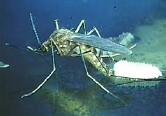
WEDNESDAY, Sept. 26 (HealthDay News) — The number of new West Nile virus cases jumped by more than 400 since last week, and the death toll now stands at 147, up from 134, U.S. health officials reported Wednesday.
As of Tuesday, 48 states had reported West Nile infections in people, birds, or mosquitoes. A total of 3,545 cases involved people. Of these cases, 1,816 (51 percent) were classified as neuroinvasive disease (such as meningitis or encephalitis) and 1,729 cases (49 percent) were classified as non-neuroinvasive disease.
The total number of West Nile cases reported so far in 2012 is the highest since 2003. Seventy percent of the cases have been reported from eight states — Texas, South Dakota, Oklahoma, Mississippi, Michigan, Louisiana, Illinois and California — and 38 percent of all cases have been in Texas, according to the U.S. Centers for Disease Control and Prevention.
This makes it one of the worst outbreaks of the mosquito-borne disease ever to hit the United States.
The best way to avoid the virus is to wear insect repellant and support local programs to eradicate mosquitoes. There is currently no treatment for West Nile virus and no vaccine to prevent it, according to the CDC.
Typically, 80 percent of people infected with the virus develop no or few symptoms, while 20 percent develop mild symptoms such as headache, joint pain, fever, skin rash and swollen lymph glands, according to the CDC.
Although most people with mild cases of West Nile virus will recover on their own, the CDC recommends that anyone who develops symptoms see their doctor right away.
People older than 50 and those with certain medical conditions, such as cancer, diabetes, hypertension, kidney disease and organ transplants, are at greater risk for serious illness.
The best way to protect yourself from West Nile virus is to avoid getting bitten by mosquitoes, which can pick up the disease from infected birds.
The CDC recommends the following steps to protect yourself:
- Use insect repellents when outside.
- Wear long sleeves and pants from dawn to dusk.
- Don’t leave standing water outside in open containers, such as flowerpots, buckets and kiddie pools.
- Install or repair windows and door screens.
- Use air conditioning when possible.
More information
For more on West Nile virus, visit the U.S. Centers for Disease Control and Prevention.

